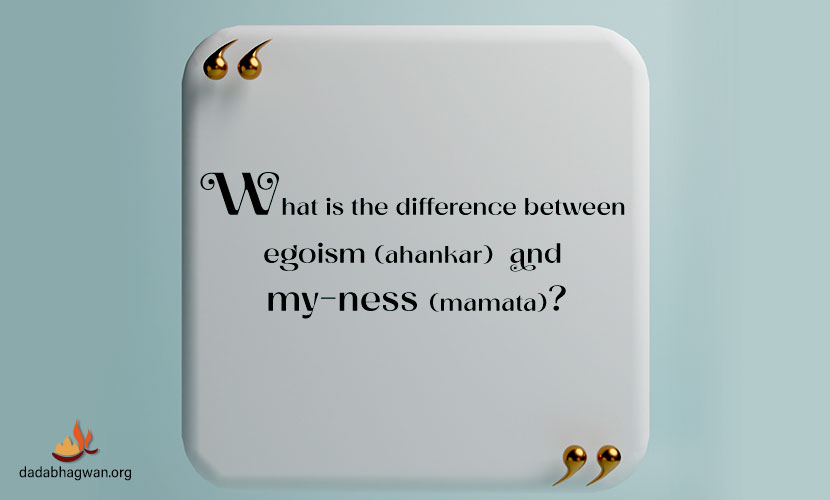How to get rid of my-ness and attain Nijanand (Bliss of the Self)?

Questioner: What is the difference between egoism (ahankar) and my-ness (mamata)?
Dadashri: The fact is that if there is egoism without the 'my-ness', it will take you to the final liberation (moksha). This egoism with my-ness has caused the entrapment. Is your egoism with or without my-ness?
Questioner: I don't know that yet.
Dadashri: You don't have my-ness? Is this body not yours?
Questioner: I am uncertain about it.
Dadashri: Are you uncertain, or is it a fact?
Questioner: There is uncertainty over what is the truth and what is false. I still don't know.
Dadashri: Although you may not know it, the my-ness is definitely there. If you lost fifty rupees right now, would you feel anxious or not?
Questioner: For a little while I would.
Dadashri: Yes, Yes, but even for a while, you will feel it right? That is my-ness. There is my-ness, one way or another.
As long as egoism is alive, my-ness is always there. And what is my-ness? The answer is that wherever there is the assertion of 'I-ness' (potapanu), and one says 'this is mine', it is my-ness (mamta). Even my-ness is an alleged intent (aropit bhaav). When the my-ness is gone, one is considered God (Bhagwan). The 'I' does not go away; the 'I' was alleged (aropit), which has now come to be placed in its true origin. The 'I' is certainly there. Its existence (astitva) is already there, but there is no awareness of one's real Self(vastutva). Once the awareness of the Self (vastutva) occurs, then it is accomplished.
Questioner: Does the alleged intent fall away?
Dadashri: Yes, it sheds away.
Questioner: Does the my-ness have to be cured?
Dadashri: But how can it be cured? They tell you to let go of this, let go of that, so what remains? If you let go of your my-ness, what remains?
Questioner: Nijanand (Bliss of the Self).
Dadashri: Yes, but has anyone learnt how to let go of 'my-ness'? Has it gone away, for anyone that has let it go? Show me who has been able to get rid of it; show me just one person. Then we will go to him, why would we do satsang here? If there is some other place where it has gone, I too will go there. It would be considered such amazing fortune, that one has been able to get rid of it in this current time cycle!
So the my-ness is not likely to go away. If one knows how to get rid of 'my' and my-ness, then nothing more remains. There is no need to even know this knowledge (Gnan). What does it mean to relinquish my-ness? You're a Jain, and so you understand this, that if you want to give up my-ness, then first you must remove your wristwatch and put it aside. It is gone. Put aside your spectacles. Then, are these your hands? You can't put them aside, leave them where they are, but are they yours? You understand that. You have to understand that you do not have any ownership. These hands are mine, these legs are mine, this is my head, these eyes are mine - take the ownership away from all these. Even this name is my-ness (marapanu). What is your name?
Questioner: *Chandubhai.
Dadashri: This Chandubhai is also my-ness. Therefore, even Chandubhai is to be set aside. 'I am her husband'; that too is 'my-ness'. 'I am this woman's husband', he'll say. You must get rid of all that my-ness. And then, 'the mind is mine, the intellect (buddhi) is mine, the chit is mine, the ahankar (ego) is mine'. And so you are left behind, and who is it that is left behind? When you get rid of all the my-ness, then who is left? There are two: 'I' and 'my', and so the 'I' is left. The real 'I'!
*Chandulal = Whenever Dadashri uses the name 'Chandulal' or the name of the person Dadashri is addressing, the reader should insert his or her name for exact understanding.
subscribe your email for our latest news and events





